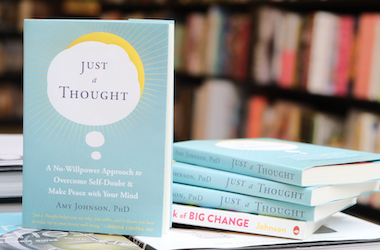The fact that you are asking yourself if you are in an unhealthy relationship is truly powerful. You’re asking. You’re questioning. It means that you are listening to an inner voice that is telling you something is off. It means that you have some growing self-awareness – and self- awareness will always serve you in every area of your life. Awareness, questioning, being curious will benefit both unhealthy and healthy relationships. If you are asking whether you are in a healthy relationship or an unhealthy relationship, it means you’re realizing that just because you’re used to it doesn’t necessarily mean it’s right for you.
It means, my friend, that you are brave enough to consider change, even if that scares you. Just taking a look in a new direction can be scary. You’ve been doing what you have been doing all this time because it honestly felt like what you could expect from a relationship. It felt familiar. It felt, well, normal.
But Is This Normal to be in an Unhealthy Relationship?
This is bigger than whether or not your relationship is unhealthy. What you are really getting brave enough to look at is whether or not an unhealthy relationship feels normal to you.

Is it normal to feel like you’re constantly criticized?
Like the other person has unrealistic expectations and demands of you?
Like you can’t actually express your thoughts and feelings or are somehow being shut down or not heard if you do?
In a normal, healthy relationship is there a sense of score-keeping?
Is it normal to feel like your worth depends on whether or not you have to have something to barter in a relationship?
It is normal to feel like you’re walking on eggshells, watching what you say so you don’t upset the other person, constantly measuring their moods and trying to predict their responses to you so you can avoid them being upset?
Is it normal to always send your attention out toward them, tracking what they say, do and feel and then strategizing about what to say, do or even feel in response to them?
Or maybe you yourself are the one who is demanding, controlling, judgmental and hyper-focused on the other person’s failings because that’s what your mind learned would protect you. These are some examples of what I hear from people who are starting to wonder if their relationship is unhealthy. Whatever the specifics are for you, you’ve clearly got a niggling feeling that there is something more than this. You’re daring to look around for another way of seeing it. You might be wondering, “is this normal?”
Actually, it is normal. It’s normal for a mind to protect you. That’s its job. It’s also normal for a mind to get confused about the best way to protect you. As a kid, it might have been a totally healthy, normal, innately self-protective thing to always keep track what others were doing. It was a survival instinct to be hyper-focused on others and push your own needs, moods, thoughts and rhythms to the back burner. Maybe that was the best way for you to keep from rocking the boat and receiving all kinds of negative, even potentially harmful attention. At the time, that might have been the safest, and therefor healthiest way of relating to major figures in your life.
But now, here you are, and you are becoming aware that something isn’t feeling right. Or you’ve been aware that it doesn’t feel good at all, but you were resigned to it, expected it, or the way you went about trying to improve it wasn’t working. Here you are, and you have a growing sense that something different might be possible. Couldn’t it?
So How Did You Get into a Toxic Relationship?
On some level, because your mind confused “safe” with a normal, “healthy relationship,” you agreed to this relationship. It’s understandable. It’s even logical. If this how you’ve always seen and understood relationships, why would you look for or expect anything else? Having learned what your “role” is in this dynamic, you yourself would act out those roles. Your mind would even think that believing you’re unworthy, always focusing on the other person, etc. is a sign of what a good person “should” do in a relationship. It’s what you learned, it’s what you knew and it fit perfectly with the other person’s own confused understanding of how to be safe in a relationship.
You got here because at one point in your life, this seemed like the healthiest choice to your mind. You are here because you are innately healthy. It’s built in for your system to take care of you. It is fundamentally, profoundly healthy that your mind takes care of you and keeps you safe. It assesses, strategizes and makes its best predictions about what will keep you out of danger. In an ironic twist of events, you got here because you are healthy. You are here because your mind made the best, healthiest choices it could at the time. It’s just that now some part of you is noticing that your mind’s “health” strategies might be outdated and not working for who you are and where you are now in life. You got here because of your mind’s innocent attempts to keep you safe and the confused thinking that came out of that. You’re here because he or she has their own confused thinking and protective strategies. Up until now, you were both playing out all those learned, unhelpful and habitual ways of being in a relation to another person.
Is it Me or is it Them?
Probably both. But also, neither. It’s your minds. It’s a clash of unexamined thoughts and protective strategies. It’s not just your own confused understanding that is taking you for a ride. The other person is caught up in their head too. We all see the world – and our relationships – through the lens of our thinking. If we believe our thinking, we’re in trouble. If we realize that a mind is like an over-protective body guard that is trying to scare us into being “safe,” then we can question it. We can take it with a grain of salt. We can understand that our young minds came to some false conclusions, that we are actually safe NOW and that we don’t have to have knee jerk responses to every thought that comes into our heads. With this awareness, positive change is potentially available for both of you. Is your partner wanting to shift too? Maybe they’re open to really seeing how you’ve both been acting on flawed thinking and habits.
Is it possible that your relationship with the other person actually is pretty wonderful?
What if the “offness” you’re feeling is actually you coming awake to the fact that your thoughts are off base?
What is it that’s really ringing your inner alarm bells?
Could the question of a healthy or unhealthy relationship actually be about seeing that you’ve had patterns of thinking that might just be patterns?
Is it about you waking up and seeing that there is something deeper than your thinking?
Could that be what isn’t matching up?
Let everything be in question. Curiosity and awareness is going to show you so much more than you realized was there.
Can I Fix My Unhealthy Relationship?
Yes. You can fix your relationship to your own thinking. You’ve already started by understanding that your thinking, your mind, is well meaning but confused. Your mind will keep giving you habitual thoughts that you are used to. That feel normal and familiar. Now you know to question your thinking – especially the thoughts that feel familiar. Notice that the old thinking isn’t helpful. Notice that you get caught in your head, taken for a ride and really suffer when you believe those thoughts.
You can definitely fix your relationship to everyone and to life itself if you start to consider that you’re okay. You’re okay even without the other person. Your mind says you need them in order to be okay. Your mind has convinced you that your path to “okayness” is through the them. But you’re already okay. More than okay. Someone might think that if they buy enough stuff they’ll finally be important. Or if they check social media enough they’ll finally feel connected. But no matter how much they buy or log on, it’s not satisfying for long. So the mind thinks it must just not be trying hard enough, doing it right or simply hasn’t bough or logged on enough and that must be why it doesn’t feel satisfying. It’s never satisfied and keeps pushing for more.
Dallin H. Oaks said, “You can never get enough of what you don’t need, because what you don’t need, won’t satisfy you.” It’s true. It doesn’t matter whether you are in a healthy or unhealthy relationship: you don’t need them in order to be okay. You are absolutely whole, regardless.

Gently probe into those thoughts, really look at the ones that say “I’m not okay!” The ones that bring you into a panic and get you checking your phone a million times, losing sleep and feeling like a simple conversation is a life or death, fight or flight situation. That’s your thinking trying to keep you safe. But you are safe now. It’s okay to take your attention off that person and go about your own life. You’re safe. The more you see this, the less pressure there is on yourself and on them.
Here’s an analogy: If you’re always outside the house, surveilling the perimeter for trouble, there’s no one home. You’re not at home in yourself, relaxed and comfortable and doing your life. All your energy goes “out there” trying to assess danger. Come back home. Sit down. Reacquaint yourself with yourself. Spend some time letting yourself be as you are, instead of trying to figure out who to be in order to be “safe.” You’re already safe.
Come back inside. You can fix your relationship to you and your own inner health. It’s there. You’ve just been so distracted by your focus on the other person, tracking them, orienting to them and planning your “moves” based on what they do that you’ve forgotten to tune into yourself. You’re in there. No matter whether you would call your past relationships healthy or unhealthy – you are healthy. YOU. Your mind has been keeping you healthy as it goes about its natural job of protecting you. Your health is even more than that, too. Your health is the you that witnesses your mind. It’s the you that can tell when your thinking is well meaning but off.
Your inner guidance comes from a sense of a true, deeper self. Your own natural guidance and resonance system is intact. Your honest preferences, opinions, rhythms are all there. Get into relationship with that health. Come back inside and come back to you instead of tracking and reacting to others.
Once you’re actually paying attention to your insides, you can actually get a sense of your honest feelings and preferences. You can be honest with yourself about ways you may have been manipulating, hiding, strategizing or otherwise perpetuating ways of relating that felt awful. Be easy on yourself. You believed your thoughts were true. Being honest with yourself also means you now have a chance of knowing your true preferences.
You can’t be honest with the other person until you know yourself enough to be honest with you.
To Stay or Not to Stay? That’s Not Really the Important Part
Whether you decide your relationship is healthy or unhealthy, whether you stay or go, whether the other person wants to grow with you or not, whether you can fix the relationship or not – as you question your thinking, new options have to open up in your life. More freedom, less pressure and change will happen. You don’t have to do anything to make it change. It’s already changing. The fact that you are questioning, self-aware, looking around, reading this and beginning to see things differently means that things are already changing. In the end it will take care of itself as you align, as you see your own health and do what makes sense from there. You won’t be able to sustain what doesn’t make sense to you anymore.
Your Relationship with You and Your Thinking
As you turn your attention towards your own innate well-being and health, you will automatically do what is more healthy for you. You will all automatically, naturally have healthier relationships, starting with the one with yourself. Everything else will reflect that. In the end, all relationships are about your healthy orientation to your own center. Welcome home to yourself and all the clarity that has come and will come from there.
Freedom from Relationship Issues with Dr. Amy Johnson
Amy Johnson is a psychologist and Change Coach who helps people find freedom from anxiety, habits, insecurity and low self-esteem. She has written several books and leads live courses and group coaching.
Amy Johnson helps find freedom from relationship issues through insight and wisdom, not willpower.
One of Amy Johnson’s most popular books is The Little Book of Big Change, about the principles behind the human experience. The Little Book of Big Change shares a unique approach to healing anxiety, worry and insecurity. The Little Book of Big Change will help you understand what is at the root of your anxiety, low self-esteem, and self-destructive habits.
About the Author

Christina Brittain is a certified Change Coach.
You can see more about Christina and her coaching services here.






